外研版初中英语八年级上册精品课件Module 8 Unit 2 I was trying to pick it up when it bite me again(共32张PPT)
文档属性
| 名称 | 外研版初中英语八年级上册精品课件Module 8 Unit 2 I was trying to pick it up when it bite me again(共32张PPT) | 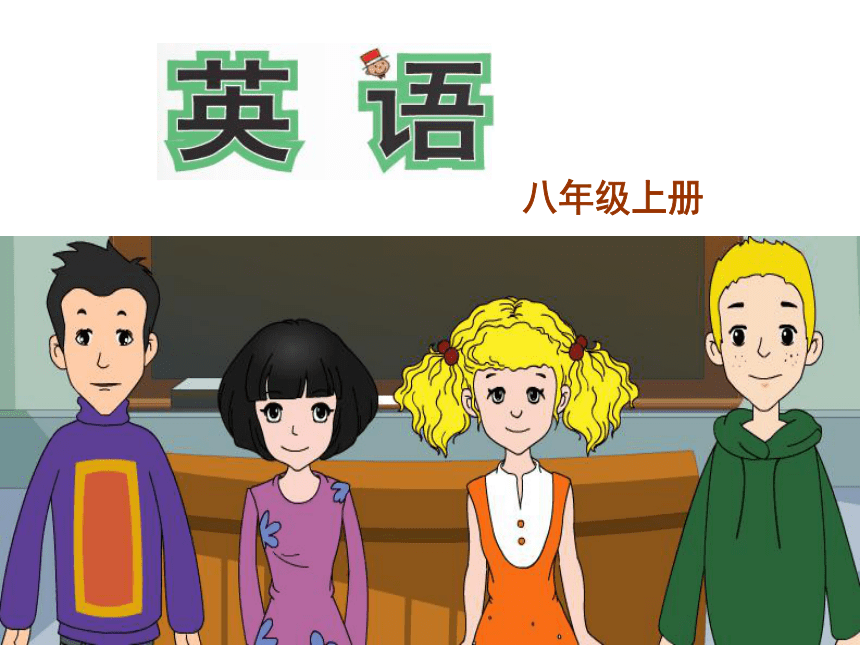 | |
| 格式 | zip | ||
| 文件大小 | 1.0MB | ||
| 资源类型 | 教案 | ||
| 版本资源 | 外研版 | ||
| 科目 | 英语 | ||
| 更新时间 | 2015-12-15 12:25:14 | ||
图片预览

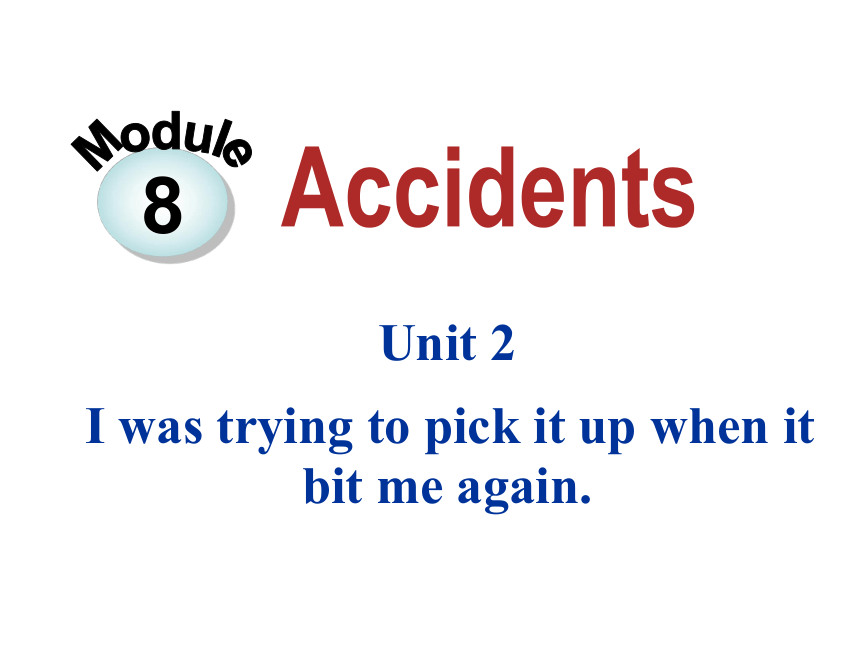
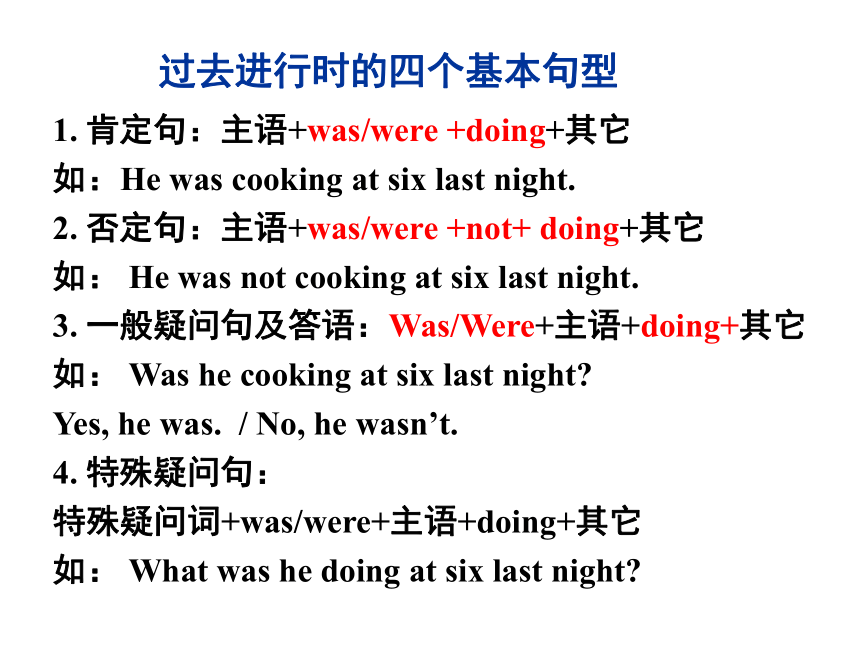
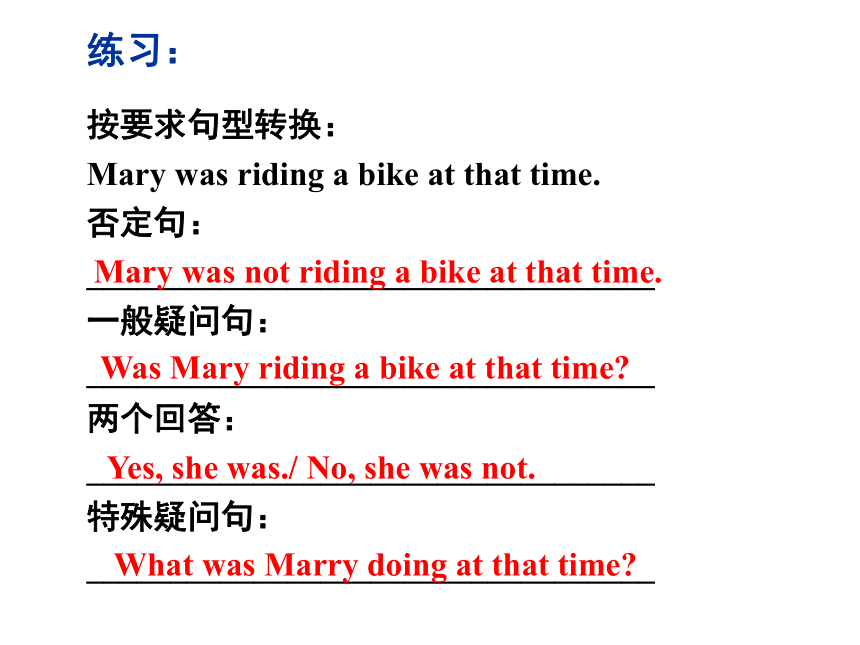
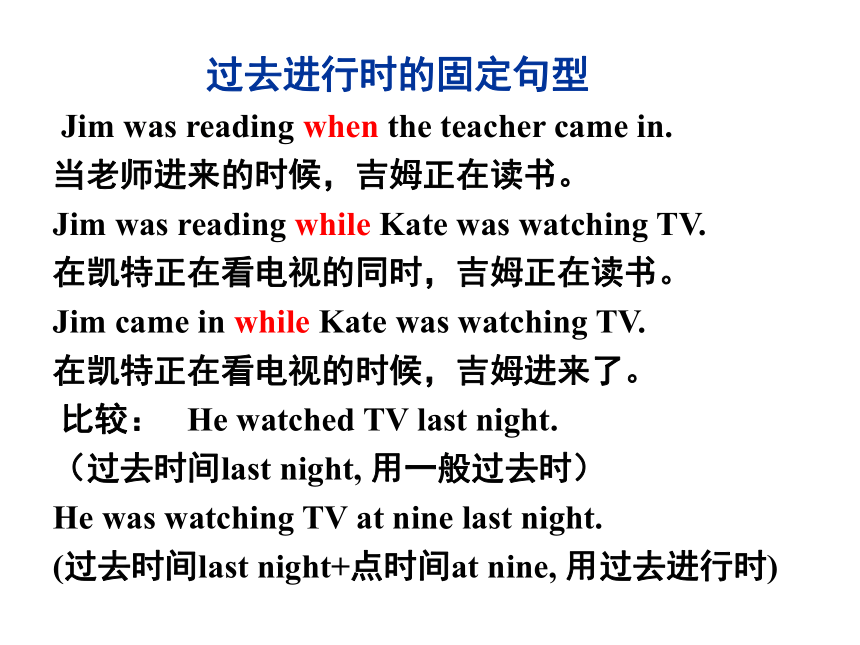
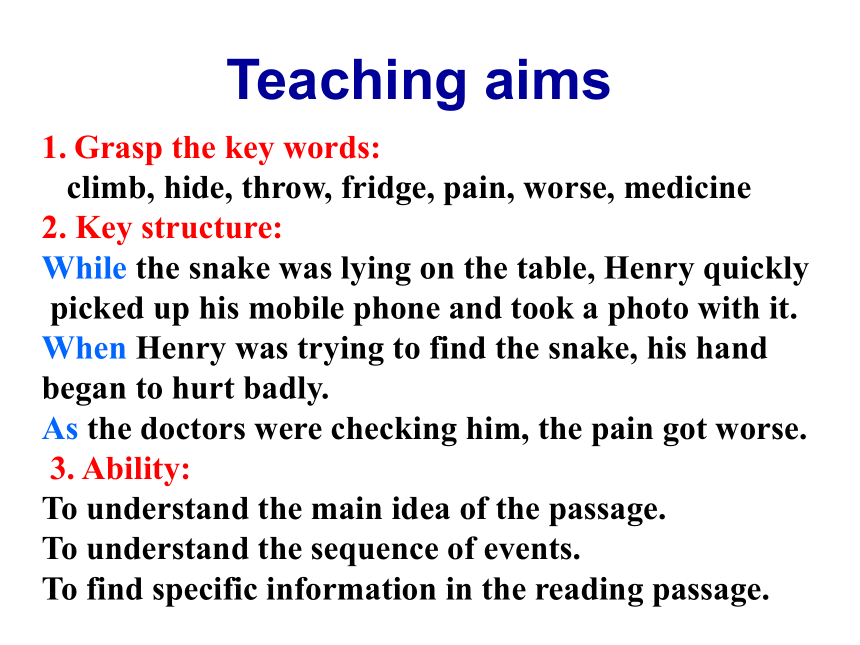
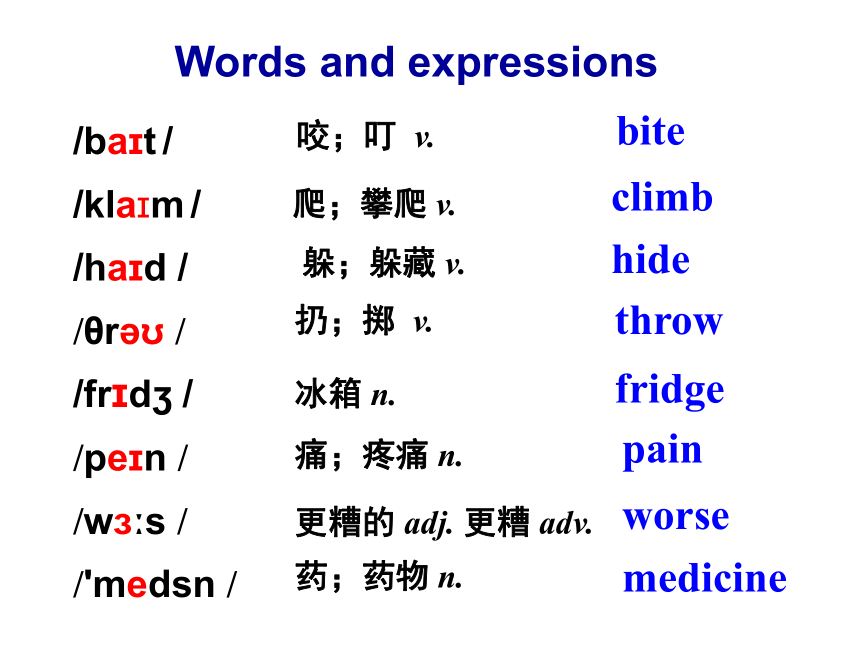
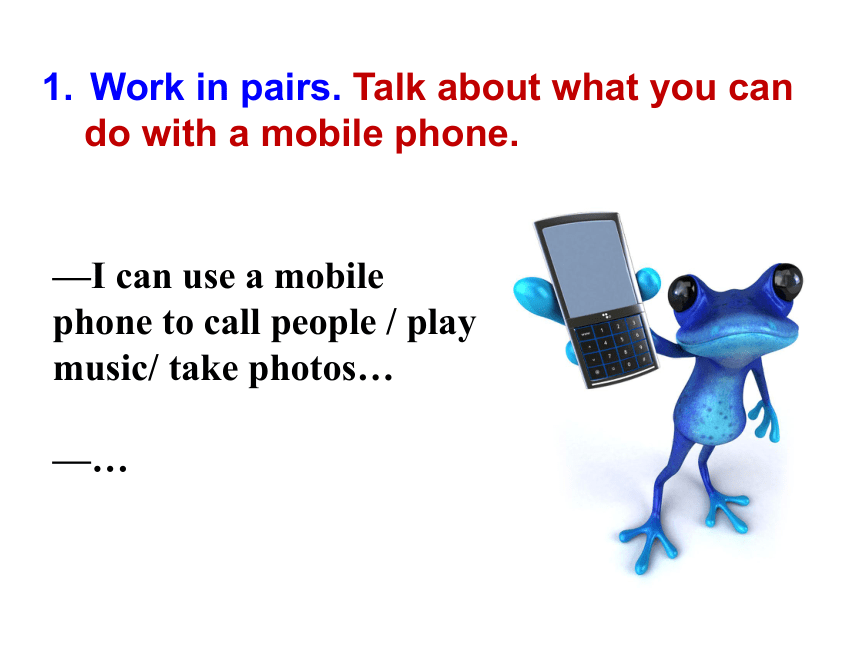
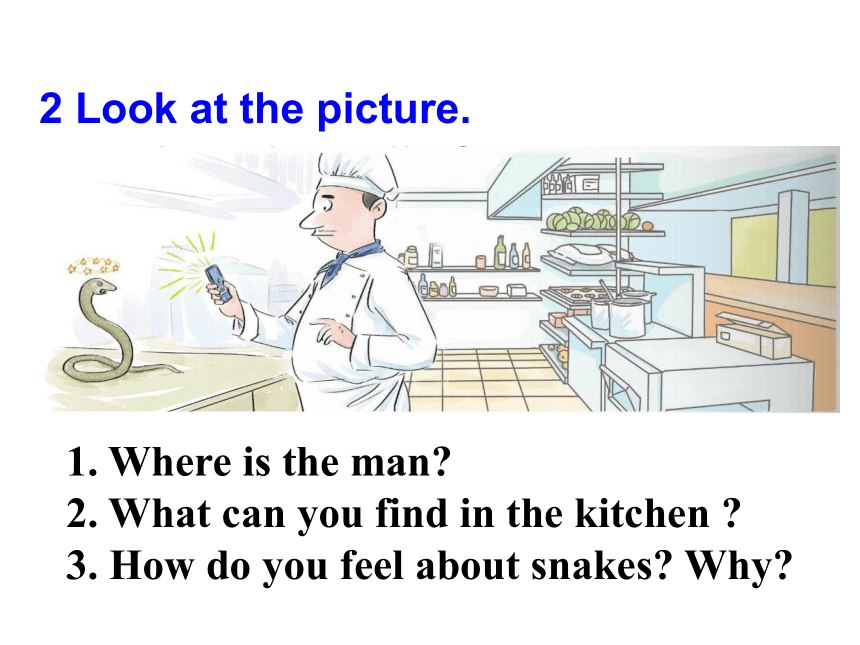
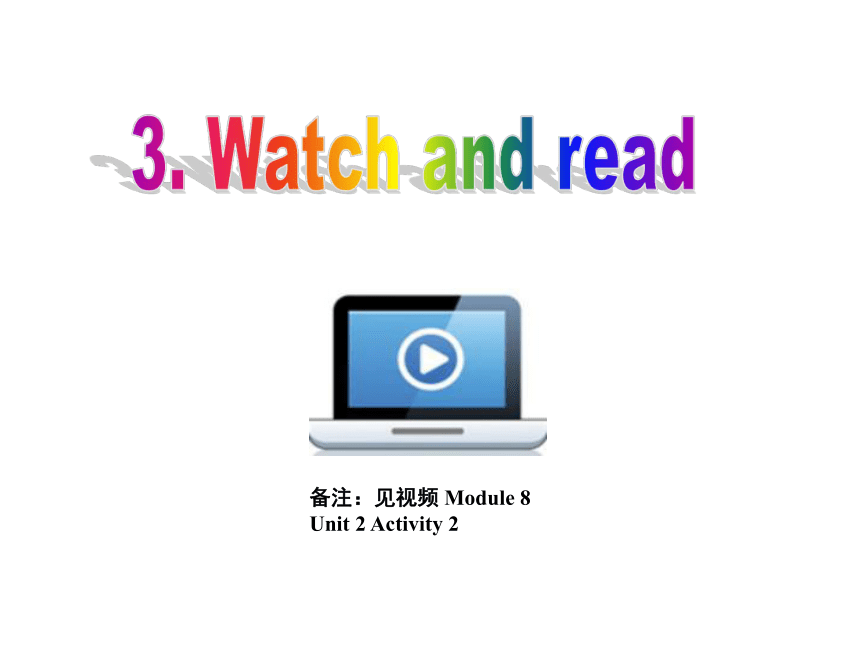
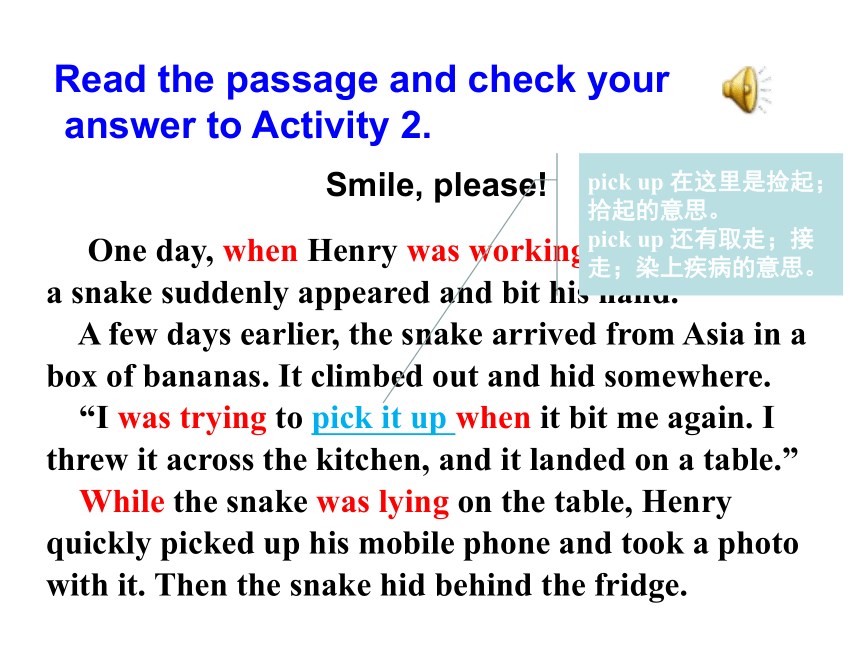
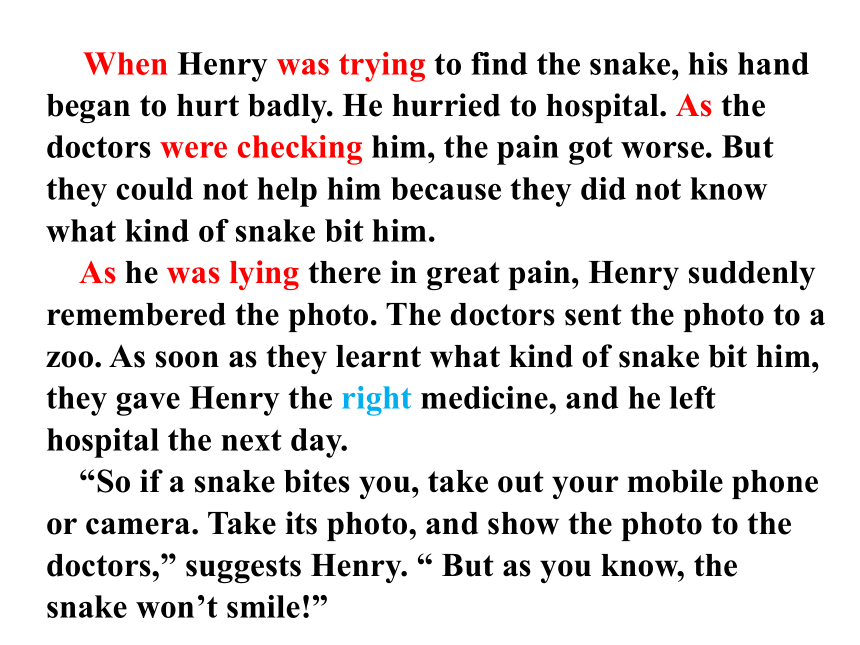
文档简介
课件32张PPT。八年级上册8ModuleUnit 2
I was trying to pick it up when it bit me again. Accidents 过去进行时的四个基本句型
1. 肯定句:主语+was/were +doing+其它
如:He was cooking at six last night.
2. 否定句:主语+was/were +not+ doing+其它
如: He was not cooking at six last night.
3. 一般疑问句及答语:Was/Were+主语+doing+其它
如: Was he cooking at six last night?
Yes, he was. / No, he wasn’t.
4. 特殊疑问句:
特殊疑问词+was/were+主语+doing+其它
如: What was he doing at six last night? 按要求句型转换:
Mary?was?riding?a?bike?at?that?time.
?
否定句:
__________________________________
?
一般疑问句:
______________________________
?
两回答:
__________________________________
?
特殊疑问句:
______________________________
?
练习:
按要求句型转换:
Mary was riding a bike at that time.
否定句:__________________________________
一般疑问句:__________________________________
两个回答:__________________________________
特殊疑问句:__________________________________Mary was not riding a bike at that time. Was Mary riding a bike at that time? Yes, she was./ No, she was not.What was Marry doing at that time? 过去进行时的固定句型
Jim was reading when the teacher came in.
当老师进来的时候,吉姆正在读书。
Jim was reading while Kate was watching TV.
在凯特正在看电视的同时,吉姆正在读书。
Jim came in while Kate was watching TV.
在凯特正在看电视的时候,吉姆进来了。
比较: He watched TV last night.
(过去时间last night, 用一般过去时)
He was watching TV at nine last night.
(过去时间last night+点时间at nine, 用过去进行时) Grasp the key words:
climb, hide, throw, fridge, pain, worse, medicine
2. Key structure:
While the snake was lying on the table, Henry quickly
picked up his mobile phone and took a photo with it.
When Henry was trying to find the snake, his hand
began to hurt badly.
As the doctors were checking him, the pain got worse.
3. Ability:
To understand the main idea of the passage.
To understand the sequence of events.
To find specific information in the reading passage.Teaching aims咬;叮 v.爬;攀爬 v.climb躲;躲藏 v.hide bite/ba?t /
/kla?m /
/ha?d /
/θr?? /
/fr?d? /
/pe?n /
/w??s /
/'medsn /
扔;掷 v.throw冰箱 n.pain痛;疼痛 n.medicine更糟的 adj. 更糟 adv.fridge药;药物 n.worseWords and expressionsWork in pairs. Talk about what you can
do with a mobile phone.
—I can use a mobile phone to call people / play music/ take photos…
—…2 Look at the picture.1. Where is the man?
2. What can you find in the kitchen ?
3. How do you feel about snakes? Why?3. Watch and read备注:见视频 Module 8
Unit 2 Activity 2 Read the passage and check your
answer to Activity 2. Smile, please!
One day, when Henry was working in a restaurant, a snake suddenly appeared and bit his hand.
A few days earlier, the snake arrived from Asia in a box of bananas. It climbed out and hid somewhere.
“I was trying to pick it up when it bit me again. I threw it across the kitchen, and it landed on a table.”
While the snake was lying on the table, Henry quickly picked up his mobile phone and took a photo with it. Then the snake hid behind the fridge.pick up 在这里是捡起;拾起的意思。
pick up 还有取走;接走;染上疾病的意思。 When Henry was trying to find the snake, his hand began to hurt badly. He hurried to hospital. As the doctors were checking him, the pain got worse. But they could not help him because they did not know what kind of snake bit him.
As he was lying there in great pain, Henry suddenly remembered the photo. The doctors sent the photo to a zoo. As soon as they learnt what kind of snake bit him, they gave Henry the right medicine, and he left hospital the next day.
“So if a snake bites you, take out your mobile phone or camera. Take its photo, and show the photo to the doctors,” suggests Henry. “ But as you know, the snake won’t smile!”Read the passage again and complete
the sentences with the information in the passage:The snake bit Henry again when __________
When Henry was trying to find the snake______
Henry hurried to hospital because______.
The doctors gave Henry the right medicine after____ .
4 Then choose the correct answer.1 The snake bit Henry again when .
a) he was throwing it across the kitchen
b) he was trying to pick it up
c) it was climbing out of a box
2 When Henry was trying to find the snake .
a) he could take a photo
b) the snake became cool
c) his hand began to hurt badly
bc3 Henry hurried to hospital because______.
a) his hand was hurting
b) he had a photo of the snake
c) the doctors called him on his mobile phone
4 The doctors gave Henry the right medicine
after______ .
a) they knew what kind of snake bit him
b) they saw the snake in the photo
c) he left hospital the next dayaa5 Complete the passage with the correct
form of the words in the box. climb hide hurt medicine pain throw A snake out of a box of bananas and ______ somewhere. When Henry was working, the snake bit him. He _______ the snake on a table and took its photo. When he was trying to find the snake, his hand began to _______ badly. At the hospital the _______ got worse. The doctors sent the photo to a zoo. After they found out what kind of snake bit him, they gave him the right _______.climbedthrewhidhurtpainmedicineI was trying to pick it up when it bit me again.
我正试图捡起它,突然它(蛇)又咬了我一口。
此句强调“蛇又咬了我一口”这个动作的发生的
突然性。请同学们比较句子“when”前后两部分的
时态:前面用过去进行时,表示一个动作正在进
行;后面用一般过去时,表示另一个动作突然发
生了。如:
They were working in the fields when it began to rain.
他们正在田里干活,突然下起雨来了。
Language points2. I threw it across the kitchen, and it landed
on a table.
我把它扔向厨房的另一边,它掉在桌子上。
across是介词,在本句中的意思是“从······的一
边到另一边”;across还可以表示“对面,穿
过”等。如:
The children ran across the street in front of our car.
这些孩子在我们的汽车前横冲过马路。
This is the only bridge across the river.
这是横跨这条河的唯一一座桥。
My best friend lives across the road.
我最好的朋友住在马路对面。
Let the words flypick sb/sth out
1) 认真挑选
Pick out all verbs in this passage.
挑出这篇文章的动词。
2) 分辨出
It was easy to pick out Bob’s father.
鲍勃的父亲很容易被认出来。
pick sb. sth.
He picked her a single red rose.
他摘了一朵红玫瑰给她。pick sb’s brains
Have you got a minute? I need to pick your brains.
你有时间吗?我需要向你请教请教。
pick sth from/off/out of
She picked the melon pips from her teeth.
她剔去牙缝里的瓜子。pick sb’s pocket
When all the fuss died down I found my pocket had been picked.
当一切混乱平息下来的时候,我发现口袋里的东西被偷了。
pick up
The vacuum cleaner won’t pick this stuff up.
吸尘器吸不走这件东西。Find these words and expressions in the passage in Activity 3.
6. Write a short story about an accident.One day... A few days earlier…
…When…
While…
When…was…
As soon as… As… One day, when a woman was getting dinner ready for the animals at the zoo, her hand began to hurt. A few days earlier…
Look at how they are used to tell the story.
Use the words and expressions to write
a new story. Start with: when 和while的用法区别
1. when既指时间点,也可指一段时间。
因此when在状语从句中的动词可以终止性动词,
也可以是延续性动词
while只指一段时间。
while从句中的动词必须是延续性动词。
2. when说明从句的动作和主句的动作可以是同时,
也可以是先后发生;
while 则强调主句的动作在从句动作的发生的过程中
或主从句两个动作同时发生。
3. when引导的时间状语从句。后用一般过去时。
while后面一般用过去进行时。
如果从句和主句的动作同时发生,两句都用过去进行时的时候,多用while引导,如:
a. When the teacher came in, we were talking.
=While we were talking, the teacher came in.
b. They were singing while we were dancing.
I ______ cooked a meal when you _____ me. a. cooked, were ringing????????
b. was cooking, rang?????
c. was cooking, were ringing???????
d. cooked, rang
2.??He said he _____ to draw a plane on the blackboard
at that time. a. tries??????????? b. tried??????????
c. was trying????????? d. will tryBC单选:3.?While she ______ TV, she ______ a sound outside
the room. a. was watching, was hearing? ?
b. watched, was hearing
c. watched, heard???????
d. was watching, heard
5.?What book ____ you ______ when I ____ you at
four yesterday afternoon? a. did, read, was seeing????
b. did, read, saw
c. were, reading, saw ?? ???
d. were, reading, DC二、根据汉语提示完成下列句子,每空一词。
1. 前段时间我发现了许多游戏。
I found many games _______________.
2. 那只猫掉进洞里,爬不出来。
The cat fell into the hole and couldn't __________ it. a few days earlierclimb out of3. 电话响起,我拿起了话筒。
The phone rang and I ___________.
4. 让我们拍一张酒店的照片。
Let’s ____________ of the hotel.picked it up take a photo1. 当我离开的时候他正在画一幅世界地图。
2. --当你看见他们的时候他们在干什么?
--他们在打扫教室。
3. 那时二班的学生没在操场上踢足球,他们在打篮球。
4.老师走进教室的时候,学生们正在谈论当天的新闻。
?When I left, he was drawing a map of the world.
?--What were they doing when you saw them?
--They were cleaning the classroom.
At that time the Class Two students were not playing football in the playground. They were playing basketball.?When the teacher came into the classroom, the
students were talking about that day’s news.
翻译: Make sentences with “when” and “while”
2. Recite the activity 3
I was trying to pick it up when it bit me again. Accidents 过去进行时的四个基本句型
1. 肯定句:主语+was/were +doing+其它
如:He was cooking at six last night.
2. 否定句:主语+was/were +not+ doing+其它
如: He was not cooking at six last night.
3. 一般疑问句及答语:Was/Were+主语+doing+其它
如: Was he cooking at six last night?
Yes, he was. / No, he wasn’t.
4. 特殊疑问句:
特殊疑问词+was/were+主语+doing+其它
如: What was he doing at six last night? 按要求句型转换:
Mary?was?riding?a?bike?at?that?time.
?
否定句:
__________________________________
?
一般疑问句:
______________________________
?
两回答:
__________________________________
?
特殊疑问句:
______________________________
?
练习:
按要求句型转换:
Mary was riding a bike at that time.
否定句:__________________________________
一般疑问句:__________________________________
两个回答:__________________________________
特殊疑问句:__________________________________Mary was not riding a bike at that time. Was Mary riding a bike at that time? Yes, she was./ No, she was not.What was Marry doing at that time? 过去进行时的固定句型
Jim was reading when the teacher came in.
当老师进来的时候,吉姆正在读书。
Jim was reading while Kate was watching TV.
在凯特正在看电视的同时,吉姆正在读书。
Jim came in while Kate was watching TV.
在凯特正在看电视的时候,吉姆进来了。
比较: He watched TV last night.
(过去时间last night, 用一般过去时)
He was watching TV at nine last night.
(过去时间last night+点时间at nine, 用过去进行时) Grasp the key words:
climb, hide, throw, fridge, pain, worse, medicine
2. Key structure:
While the snake was lying on the table, Henry quickly
picked up his mobile phone and took a photo with it.
When Henry was trying to find the snake, his hand
began to hurt badly.
As the doctors were checking him, the pain got worse.
3. Ability:
To understand the main idea of the passage.
To understand the sequence of events.
To find specific information in the reading passage.Teaching aims咬;叮 v.爬;攀爬 v.climb躲;躲藏 v.hide bite/ba?t /
/kla?m /
/ha?d /
/θr?? /
/fr?d? /
/pe?n /
/w??s /
/'medsn /
扔;掷 v.throw冰箱 n.pain痛;疼痛 n.medicine更糟的 adj. 更糟 adv.fridge药;药物 n.worseWords and expressionsWork in pairs. Talk about what you can
do with a mobile phone.
—I can use a mobile phone to call people / play music/ take photos…
—…2 Look at the picture.1. Where is the man?
2. What can you find in the kitchen ?
3. How do you feel about snakes? Why?3. Watch and read备注:见视频 Module 8
Unit 2 Activity 2 Read the passage and check your
answer to Activity 2. Smile, please!
One day, when Henry was working in a restaurant, a snake suddenly appeared and bit his hand.
A few days earlier, the snake arrived from Asia in a box of bananas. It climbed out and hid somewhere.
“I was trying to pick it up when it bit me again. I threw it across the kitchen, and it landed on a table.”
While the snake was lying on the table, Henry quickly picked up his mobile phone and took a photo with it. Then the snake hid behind the fridge.pick up 在这里是捡起;拾起的意思。
pick up 还有取走;接走;染上疾病的意思。 When Henry was trying to find the snake, his hand began to hurt badly. He hurried to hospital. As the doctors were checking him, the pain got worse. But they could not help him because they did not know what kind of snake bit him.
As he was lying there in great pain, Henry suddenly remembered the photo. The doctors sent the photo to a zoo. As soon as they learnt what kind of snake bit him, they gave Henry the right medicine, and he left hospital the next day.
“So if a snake bites you, take out your mobile phone or camera. Take its photo, and show the photo to the doctors,” suggests Henry. “ But as you know, the snake won’t smile!”Read the passage again and complete
the sentences with the information in the passage:The snake bit Henry again when __________
When Henry was trying to find the snake______
Henry hurried to hospital because______.
The doctors gave Henry the right medicine after____ .
4 Then choose the correct answer.1 The snake bit Henry again when .
a) he was throwing it across the kitchen
b) he was trying to pick it up
c) it was climbing out of a box
2 When Henry was trying to find the snake .
a) he could take a photo
b) the snake became cool
c) his hand began to hurt badly
bc3 Henry hurried to hospital because______.
a) his hand was hurting
b) he had a photo of the snake
c) the doctors called him on his mobile phone
4 The doctors gave Henry the right medicine
after______ .
a) they knew what kind of snake bit him
b) they saw the snake in the photo
c) he left hospital the next dayaa5 Complete the passage with the correct
form of the words in the box. climb hide hurt medicine pain throw A snake out of a box of bananas and ______ somewhere. When Henry was working, the snake bit him. He _______ the snake on a table and took its photo. When he was trying to find the snake, his hand began to _______ badly. At the hospital the _______ got worse. The doctors sent the photo to a zoo. After they found out what kind of snake bit him, they gave him the right _______.climbedthrewhidhurtpainmedicineI was trying to pick it up when it bit me again.
我正试图捡起它,突然它(蛇)又咬了我一口。
此句强调“蛇又咬了我一口”这个动作的发生的
突然性。请同学们比较句子“when”前后两部分的
时态:前面用过去进行时,表示一个动作正在进
行;后面用一般过去时,表示另一个动作突然发
生了。如:
They were working in the fields when it began to rain.
他们正在田里干活,突然下起雨来了。
Language points2. I threw it across the kitchen, and it landed
on a table.
我把它扔向厨房的另一边,它掉在桌子上。
across是介词,在本句中的意思是“从······的一
边到另一边”;across还可以表示“对面,穿
过”等。如:
The children ran across the street in front of our car.
这些孩子在我们的汽车前横冲过马路。
This is the only bridge across the river.
这是横跨这条河的唯一一座桥。
My best friend lives across the road.
我最好的朋友住在马路对面。
Let the words flypick sb/sth out
1) 认真挑选
Pick out all verbs in this passage.
挑出这篇文章的动词。
2) 分辨出
It was easy to pick out Bob’s father.
鲍勃的父亲很容易被认出来。
pick sb. sth.
He picked her a single red rose.
他摘了一朵红玫瑰给她。pick sb’s brains
Have you got a minute? I need to pick your brains.
你有时间吗?我需要向你请教请教。
pick sth from/off/out of
She picked the melon pips from her teeth.
她剔去牙缝里的瓜子。pick sb’s pocket
When all the fuss died down I found my pocket had been picked.
当一切混乱平息下来的时候,我发现口袋里的东西被偷了。
pick up
The vacuum cleaner won’t pick this stuff up.
吸尘器吸不走这件东西。Find these words and expressions in the passage in Activity 3.
6. Write a short story about an accident.One day... A few days earlier…
…When…
While…
When…was…
As soon as… As… One day, when a woman was getting dinner ready for the animals at the zoo, her hand began to hurt. A few days earlier…
Look at how they are used to tell the story.
Use the words and expressions to write
a new story. Start with: when 和while的用法区别
1. when既指时间点,也可指一段时间。
因此when在状语从句中的动词可以终止性动词,
也可以是延续性动词
while只指一段时间。
while从句中的动词必须是延续性动词。
2. when说明从句的动作和主句的动作可以是同时,
也可以是先后发生;
while 则强调主句的动作在从句动作的发生的过程中
或主从句两个动作同时发生。
3. when引导的时间状语从句。后用一般过去时。
while后面一般用过去进行时。
如果从句和主句的动作同时发生,两句都用过去进行时的时候,多用while引导,如:
a. When the teacher came in, we were talking.
=While we were talking, the teacher came in.
b. They were singing while we were dancing.
I ______ cooked a meal when you _____ me. a. cooked, were ringing????????
b. was cooking, rang?????
c. was cooking, were ringing???????
d. cooked, rang
2.??He said he _____ to draw a plane on the blackboard
at that time. a. tries??????????? b. tried??????????
c. was trying????????? d. will tryBC单选:3.?While she ______ TV, she ______ a sound outside
the room. a. was watching, was hearing? ?
b. watched, was hearing
c. watched, heard???????
d. was watching, heard
5.?What book ____ you ______ when I ____ you at
four yesterday afternoon? a. did, read, was seeing????
b. did, read, saw
c. were, reading, saw ?? ???
d. were, reading, DC二、根据汉语提示完成下列句子,每空一词。
1. 前段时间我发现了许多游戏。
I found many games _______________.
2. 那只猫掉进洞里,爬不出来。
The cat fell into the hole and couldn't __________ it. a few days earlierclimb out of3. 电话响起,我拿起了话筒。
The phone rang and I ___________.
4. 让我们拍一张酒店的照片。
Let’s ____________ of the hotel.picked it up take a photo1. 当我离开的时候他正在画一幅世界地图。
2. --当你看见他们的时候他们在干什么?
--他们在打扫教室。
3. 那时二班的学生没在操场上踢足球,他们在打篮球。
4.老师走进教室的时候,学生们正在谈论当天的新闻。
?When I left, he was drawing a map of the world.
?--What were they doing when you saw them?
--They were cleaning the classroom.
At that time the Class Two students were not playing football in the playground. They were playing basketball.?When the teacher came into the classroom, the
students were talking about that day’s news.
翻译: Make sentences with “when” and “while”
2. Recite the activity 3
同课章节目录
- Module 1 How to learn English
- Unit 1 Let's try to speak English as much as possi
- Unit 2 You should smile at her.
- Unit 3 Language in use .
- Module 2 My home town and my country
- Unit 1 It's taller than many other buildings.
- Unit 2 Cambridge is a beautiful city in the east o
- Unit 3 Language in use .
- Module 3 Sports.
- Unit 1 Nothing is more exciting than playing tenni
- Unit 2 This year we training more carefully.
- Unit 3 Language in use .
- Module 4 Planes, ships and trains .
- Unit 1 He lives the farthest from school.
- Unit 2 What is the best way to travel.
- Unit 3 Language in use .
- Module 5 Lao She Teahouse.
- Unit 1 I wanted to see the Beijing Opera.
- Unit 2 It descibes the changes in Chinese society.
- Unit 3 Language in use .
- Module 6 Animals in danger.
- Unit 1 It allows people to get closer to them .
- Unit 2 The WWF is working hard to save them all.
- Unit 3 Language in use .
- Revision module A
- Module 7 A famous story
- Unit 1 Alice was sitting with her sister by the ri
- Unit 2 She was thinking about her cat.
- Unit 3 Language in use .
- Module 8 Accidents
- Unit 1 While the car were changing to red, a car s
- Unit 2 I was trying to pick it up when it bite me
- Unit 3 Language in use .
- Module 9 Population
- Unit 1 The population of China is about 1.37 billi
- Unit 2 Arnwick was a city with 200,000 people.
- Unit 3 Language in use .
- Module 10 The weathe
- Unit 1 It might snow.
- Unit 2 The weather is fine all year round.
- Unit 3 Language in use .
- Module 11 Way of life
- Unit 1 In China ,we open a gift later.
- Unit 2 In England, you usually drink tea with milk
- Unit 3 Language in use .
- Module 12 Help
- Unit 1 What should we do before help arrives?
- Unit 2 Stay away from windows and heavy furniture.
- Unit 3 Language in use .
- Revision module B
